Leading the vanguard of sustainable viticulture in California and with a focus on a lighter, more restrained style, Matthiasson makes wines only from sites where they also help lead the farming, where all vineyards are either certified organic or transitioning/practicing organic
2020 Napa Valley Cabernet Franc, Matthiasson Vineyard
100% Cabernet Franc
pH: 3.8 | TA: 7.83 g/L | ABV: 12.0%
Dry-farmed | 236 cases produced
Élevage: 50% whole clusters, fermented in small open top bins, with two punch downs per day. We gently pressed just after dryness, and aged the wine in neutral puncheons for 10 months.
Distinct aromas of dry leaves in the fall, poblano chili peppers, and sage, with plummy fruit. The tannins are very soft in the mouth, with an iron-like minerality on the finish. It’s light on the palate but firm at the same time — it’s a wine with many contradictions that is hard to describe with tasting notes. Easy drinking, but incredibly complex. Great with food.
Sold Out
2021 Napa Valley Chardonnay, Linda Vista Vineyard
100% Chardonnay
pH: 3.45 | TA: 7.2 g/L | ABV: 12.5%
2601 cases produced
CCOF Certified Organic Grapes
Élevage: Whole cluster pressed, native yeast ferment, fermented in neutral oak barrel and aged, no battonage or racking, 2/5 of barrels go through malolactic fermentation
Golden Delicious apples, yellow peaches, musk melon, and honey on the nose and through to the palate, the medium acidity is balanced by pleasant fleshiness, finishing very clean with a hint of minerality. Refreshing and with moderate alcohol, this wine is all about pleasure, begging to be drunk up, with some oysters or a roast chicken and a big smile.
Sold Out
2019 Napa Valley Cabernet Sauvignon, Dead Fred Vineyard
100% Cabernet Sauvignon Sub-Appelation: Coombsville
pH: 3,78 | TA: 5,373 g/L | ABV: 13,5%
Organic Farming Practices | Dry-farmed | 91 cases produced
Vineyard: Rocky volcanic, SW Exposure
Élevage: 32 months large format demi-muid barrels from French Oak (Atalier)
The Dead Fred Vineyard in Coombsville sits on a rocky volcanic knolltop. The combination of warm volcanic soil and cool marine air creates fruit that is uncommonly structured and ripe, yet fresh and minerally.
This wine always has signature black fruits and graphite, very full, yet light and mineral (“weight without heaviness”), a special wine which will develop for many years.
Steve Matthiasson
Steve Matthiasson studied philosophy before delving into horticulture at UC Davis.
In 1994, he found a job in vineyards and orchards working for a small sustainable agriculture consulting firm.
He co-authored the Lodi Sustainability Handbook in 1999, a pioneer which gave rise to the Lodi Rules certification process, in addition to co-authoring the California Code of Sustainable Winegrowing.
In 2002 he started consulting onvineyard practices in Napa and has consulted for, among others: Stag’s Leap Wine Cellars, Spottswoode Winery, Dalla Valle, and Araujo Estate (now Eisele).
Jill Matthiasson
Jill Matthiasson studied botany at Penn, and studied traditional methods for soil health in grad school at UC Davis.
She pioneered “farmer to farmer” networking for sustainability in the early 90’s while working for a family farming non-profit, and ran programs training farmers on direct sales, such as CSA’s and farmers markets for over a decade as Program Director for the Community Alliance for Family Farmers, helping give birth to the renaissance of "farm-to-table".
Jill runs the business side of the family farming & wine business, alongside teaching cooking from the garden classes, and serving on the Napa Farmer’s Market board.
The Vineyards
A pioneer in sustainability from before the establishment of their winery in 2003, with their ethos based on being farmers first, Matthiasson focuses on soil and ecosystem health, whether that be converting vineyards to no-till to minimize their carbon footprint and soil compaction or planting California perennial native grasses to rebuild top soil and increase water infiltration. Any new vines planted are set up to be dry farmed, while glass is made locally and lightweight as possible.
Social Responsibility
Sustainability at Matthiasson encompasses a holistic approach, extending beyond regenerative viticulture. The winery operates on 100% renewable energy and prioritizes social responsibility. This commitment is evident in their full-time employment model, ensuring staff stability even during the pandemic.
Matthiasson actively promotes inclusivity through initiatives like their Women in Winemaking internship program and the 280 Project, which aims to increase diversity in the wine industry by connecting people of color with industry professionals.









